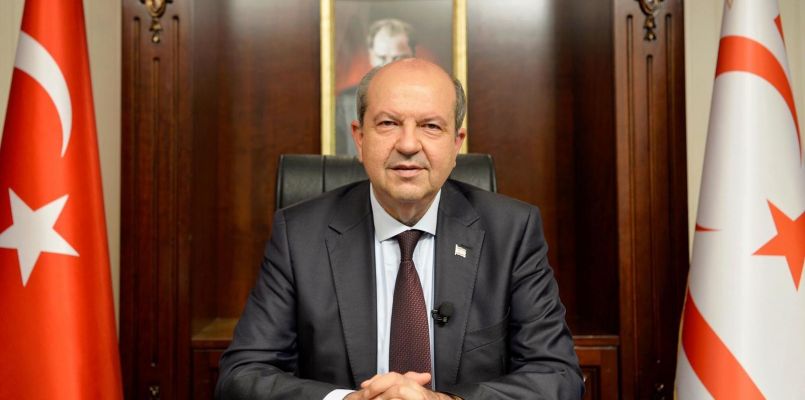President Ersin Tatar speaks to TRT World

President Ersin Tatar has said that he will participate in negotiations on the basis of sovereign equality of two neighbourly States, which are engaged in a relationship of cooperation, after decades of negotiations for a federal settlement have been “exhausted”.
The President made these remarks during a televised appearance on the programme, Strait Talk, broadcast on TRT World on Friday.
President Tatar said that negotiations over the past decades for a federal settlement has been exhausted due to the Greek Cypriots’ unwillingness to share power and prosperity with the Turkish Cypriot people – which he said are “one of the co-owners” of the island stemming from international treaties.
“Our position for a two State settlement is fully backed by Turkey,” President Tatar said. “We have made several attempts to justify our legal and political arguments in relation to why there is a need for a settlement that is based on sovereign equality and two States that co-exist side-by-side who cooperate in different fields.”
President Tatar said that “this is the situation on the ground in Cyprus anyway,” adding that “Britain had transferred sovereignty in 1960 to two co-founding peoples, the Turkish Cypriots and Greek Cypriots. This is a very important point which is also being stated to us by legal experts, judges and legal authorities in the world,” he said.
Explaining that the Turkish Cypriot rights had been usurped by the Greek Cypriot side, President Tatar underlined that the Turkish Cypriot people had over the decades run their own affairs under their own administration. Following the failures to reach a settlement, the Turkish Cypriots proclaimed the TRNC through their sovereign right.
Stating that the UN Security Council resolutions have been in existence dating back to even before the Greek Cypriot side was unilaterally and unfairly admitted to the EU, President Tatar added: “A lot of things have happened since then. Arduous negotiations aimed at securing a comprehensive settlement based on a federal structure have been exhausted despite the concessions made by the Turkish Cypriot side and the Republic of Turkey, made through good intentions that include the Annan Plan in 2004 and again in Crans Montana, Switzerland, in 2017. The Greek Cypriots have consistently refused an agreement that is based on a power sharing arrangement under a federal basis.”
Explaining the reasons why previous attempts for a settlement have failed, the President said that this was because of the hegemonic aspiration of the Greek Cypriot side in seeking to spread its authority to the North.
“The Greek Cypriots believe that they will, over time, be able to overtake the North following the withdrawal of Turkey – which is not an EU member state -- from the island and make the Turkish Cypriots a minority,” President Tatar said.
In relation to the two State position of the Turkish side, which President Tatar said was his policy that was fully supported by Turkish Cypriots and Turkey following his election victory last October, he added: “All other opportunities have been exhausted. The upcoming five-plus-UN informal meeting, which may be held towards the end of April, will allow the parties to express their own positions. This is why we have been invited to this meeting – whether it is held in New York or Geneva. . . being able to think outside the box and put forward new ideas is also a view that has been expressed by UN Secretary General, H.E. Antonio Guterres,” President Tatar said.
“The UN accepts that if there is going to be a settlement on the island, both sides need to agree to that. Both sides need to mutually accept the settlement,” President Tatar added.
President Tatar remarked that the “TRNC already exists and it is recognised and supported by Turkey”, which he said “is the most powerful country in the region”. He added that TRNC is, via Turkey, open to the whole world in the fields of tourism and high education and all the other sectors of the economy.
“We are working for a secure future for our children and the next generation,” Mr Tatar said.

